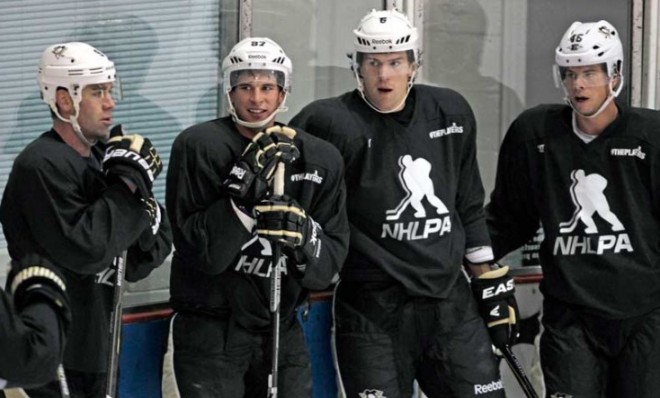Dissecting the massive costs of the NHL lockout
The players have lost some $400 million in income. The league is losing some $20 million per day. And no end to the labor dispute is in sight

A free daily email with the biggest news stories of the day – and the best features from TheWeek.com
You are now subscribed
Your newsletter sign-up was successful
When the National Hockey League lost its entire 2004-2005 season because of a lockout, the NHL should have learned a valuable lesson. Sadly, this year's stalled labor negotiations between the NHL and players prove that the lost season taught the sport nothing. After more than two months, the 2012 lockout still hasn't ended — indeed, there is no end in sight — and the costs are mounting for all sides.
The NHL, which earned $3.3 billion last year, is losing out on potential revenue with every ticket that isn't bought, every jersey that isn't purchased, and every game that isn't televised. The players, who collectively earned $1.7 billion last season, are, of course, losing out on paychecks while they're kept off the ice. As of last week, the lockout had already cost players some $400 million in income, Forbes reports.
Fans are suffering, too. And judging by the fan exodus after the 2004-2005 lockout, and the fact that many fans are frustrated if not irate that owners and players have essentially been having the same fight over dividing revenue for nearly two decades, it's not likely that hockey will escape this lockout unscathed.
The Week
Escape your echo chamber. Get the facts behind the news, plus analysis from multiple perspectives.

Sign up for The Week's Free Newsletters
From our morning news briefing to a weekly Good News Newsletter, get the best of The Week delivered directly to your inbox.
From our morning news briefing to a weekly Good News Newsletter, get the best of The Week delivered directly to your inbox.
In 1994, the NHL, led by Commissioner Gary Bettman, tried to put a cap on salaries, with the idea that when teams violated that cap, a subsequent revenue-sharing model would distribute earnings from big-market teams to smaller-market teams. When players balked, the league locked them out. Eventually they reached an agreement — but not before nearly half the season was canceled.
Fast forward to 2004. Once again, the league proposed a luxury tax if teams exceeded a salary cap, and once again, the players said no. This time, the lockout lasted more than 300 days, from September 2004 until July 2005. It was the first time a professional sports league canceled an entire season. Hockey fans learned to their dismay that they simply couldn't depend on the NHL.
Fans weren't alone in abandoning the NHL. After the 2004-2005 lockout ended, more than 200 players retired, according to the Edmonton Journal. In the past decade, the average number of players to retire every season is between 100 and 130.
Only recently, thanks in no small part to last year's fan-alienating NBA lockout, the NHL has started to bounce back. But when Bettman announced a third lockout this year, he essentially squandered what little goodwill the NHL had left.
A free daily email with the biggest news stories of the day – and the best features from TheWeek.com
If the NHL thought the lockout hurt them in 2004, wait till they see the fallout in 2012. This year, the players' union is represented by Donald Fehr, who helped baseball players dodge a salary cap during the season-ending 1994 MLB strike. Like Bettman, Fehr seems completely comfortable losing a season to ensure his side's interests.
Two months into the NHL lockout, after a number of negotiation meetings, there is still a $182 million gap between what the NHL and the players' association want, according to Fehr. That represents 5 percent of the league's total expected annual revenue; in other words, the two sides are still really, really far apart.
Over Thanksgiving weekend, the NHL canceled games through December 14, in addition to the All-Star Game in January. The Winter Classic, hockey's other big exhibition event, which was set to take place on January 1, was called off in early November. In total, 422 of 1,230 total games have been canceled — or 34.3 percent of the season. Last Wednesday, Bettman told the media that every day a game isn't played, the league loses between $18 million and $20 million.
While the league and players continue to bicker, at least one TV network is losing out big-time, too. Last year, NBC Sports Network signed a 10-year, $1.8 billion deal for exclusive broadcasting rights to NHL games. In the contract's first year, about 600,000 people watched each regular season game, according to AdWeek. About 2.07 million tuned into Game 4 of the 2012 Stanley Cup finals. The network made $150 million from hockey, most of which was earned during the playoffs. Now that the season is canceled through at least December 14, the network is scrambling to fill their schedule.
Everyone is losing money: the league, the players, media partners, cities that reap revenue from pro-sports franchises — everyone. And fans are fleeing. The NHL is nearing the point of no return.